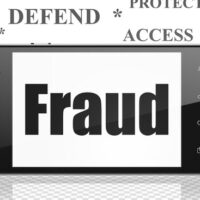Top Seven Kinds of Fraud in Hillsborough County

No matter what prosecutors urge in court, not every false statement or misrepresentation constitutes fraud. The law narrowly defines fraud as an intentional misrepresentation of a material, existing fact which one person makes to another with knowledge of its falsity and for the purpose of inducing the other person to act, and upon which the other person relies with resulting injury or damage.
In both state and federal court, fraud is typically a serious felony. A conviction means high fines at the very least — and usually a prison sentence if a significant amount of money is involved — loss of professional reputation, and extended court supervision. A Tampa fraud lawyer can reduce or eliminate some or all of these consequences.
Regardless of the type of fraud, prosecutors must prove their cases beyond a reasonable doubt. That’s the highest standard of proof in federal law.
Bank Fraud
One of the most common kinds of fraud is also a good example of the intentional misstatement problem discussed above. If Desmond convinces the bank to give him a loan because he says his business will rapidly expand, Desmond has not committed fraud, even if he knows his business will not grow. He did not misrepresent a current fact.
Mail and Wire Fraud
Using the mail, the telephone, or the internet to perpetuate any fraud, whether or not it is financial, constitutes mail fraud. In fact, every time the defendant licks a stamp, picks up the phone, or presses “send,” prosecutors can add an additional mail fraud count. That’s why many fraud indictments have hundreds of counts.
Tax Fraud
There is a difference between an honest mistake and a dishonest statement, but the difference is in a grey area. Generally, if the error was more than 10 percent of the total tax due or included a grievous mistake, such as failing to report an entire income source, IRS lawyers may pursue fraud charges.
Healthcare Fraud
The same principle applies in this context. Accounting errors are usually not fraudulent, but billing for services not rendered or inventing fake patients is definitely fraudulent. Other healthcare fraud cases involve erroneous coding or billing practices. These types of healthcare fraud are difficult to prove in court.
Insurance Fraud
Continuing a similar theme, insurance fraud matters usually involve either bloated repair estimates or fraudulent claims. Fallacious claims are difficult to defend. However, if the insured party received several repair estimates and submitted the highest one, there may have been no intent to mislead the insurance company. The insured party may have legitimately thought that the submitted estimate was the best one.
Bankruptcy Fraud
Omitting assets from a bankruptcy filing is usually fraudulent, as is transferring property at below market value to an insider like a friend or relative. Many times, our Tampa criminal defense attorneys can work out a favorable out-of-court settlement in these matters.
Mortgage Fraud
Most commonly, mortgage applicants claim the property will be owner-occupied to obtain a mortgage. As far as the bank is concerned, “owner occupied” usually means that the owner is at the property 365 days a year. But as mentioned above, the definition of fraud is much narrower than that.
Count on Aggressive Lawyers
The easiest way to beat fraud charges is to meet the allegations head-on with a Board Certified Criminal Trial Lawyer. For a free consultation with Nicholas G. Matassini, Board Certified in Criminal Trial Law by The Florida Bar, contact The Matassini Law Firm, P.A. in Tampa. Convenient payment plans are available.
